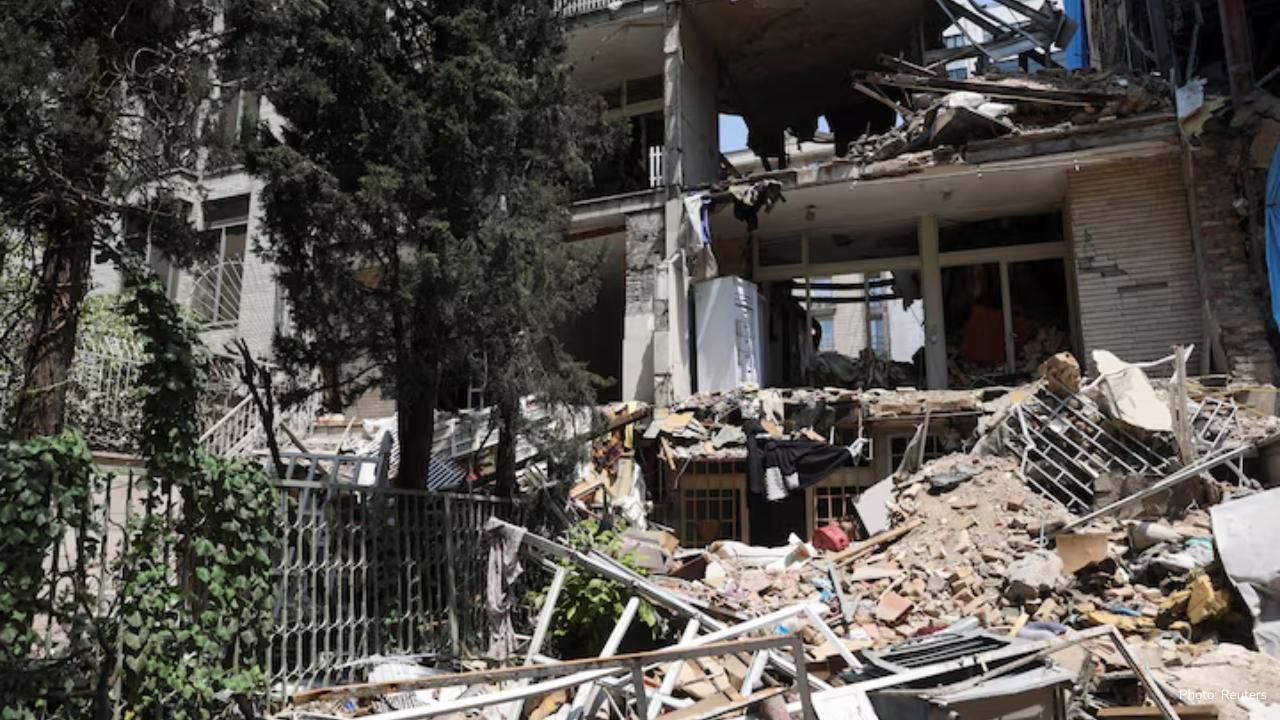
Post by : Monika
On September 29, 2025, Iran carried out the execution of Bahman Choubi-asl, a man accused of spying for Israel. The Iranian judiciary described him as "one of the most important spies for Israel in Iran." This latest event has highlighted the ongoing tensions between Iran and Israel and brought international attention to Iran's strict security and judicial measures.
Who Was Bahman Choubi-asl?
Bahman Choubi-asl was accused of collaborating with Mossad, Israel's national intelligence agency. Iranian authorities say he provided sensitive information to Israel that could have compromised national security. According to reports, his alleged actions involved accessing confidential government databases, sharing state secrets, and helping Israel gather intelligence about Iran's military and technological operations.
Iranian media also reported that Choubi-asl investigated the country’s electronic import routes and other logistical networks. Authorities claimed that his activities were a serious threat to Iran’s security infrastructure and that his execution was meant to prevent further damage.
Charges and Legal Process
Choubi-asl was charged with “corruption on earth,” a serious offense under Iranian law. This charge is often used in Iran to punish crimes that are considered extremely harmful to society, including espionage, murder, and large-scale corruption.
The Supreme Court of Iran reviewed Choubi-asl’s appeal but rejected it, confirming the death sentence. The Iranian judiciary's official news outlet, Mizan, reported that all legal procedures had been completed and that the execution followed proper judicial orders.
The Execution
The execution was carried out under strict security measures. Officials did not provide details about the method, but such executions in Iran are often conducted publicly or semi-publicly as a warning against similar activities.
This execution is part of a broader pattern of Iran punishing individuals accused of espionage. This year alone, at least ten people have reportedly been executed for allegedly spying for Israel. The Iranian government has repeatedly stated that it will not tolerate threats from foreign intelligence agencies and will act decisively against anyone suspected of collaborating with enemies.
Iran-Israel Tensions
The execution occurs against the backdrop of rising tensions between Iran and Israel. In June 2025, Israel carried out several military operations within Iranian territory, reportedly targeting nuclear and military facilities. These operations intensified hostilities between the two nations.
Iran has accused Israel of attempting to weaken its military capabilities through covert operations and espionage. Israel, on the other hand, has claimed that its actions are defensive, aimed at preventing Iran from obtaining nuclear weapons or expanding its military influence in the region.
Experts suggest that espionage, cyber-attacks, and covert operations have become central to the Iran-Israel conflict. Executions like that of Choubi-asl are meant to serve as a warning to other potential spies and as a demonstration of Iran's determination to protect its national security.
International Reactions
The execution has drawn attention from the international community. Human rights organizations have criticized Iran for what they describe as harsh punishments and the lack of transparency in its judicial processes. They argue that confessions in espionage cases in Iran are often forced and that defendants do not always receive fair trials.
On the other hand, some nations see Iran’s actions as an internal matter. They acknowledge Iran’s right to enforce laws to protect its national security but express concern about the use of capital punishment for espionage cases.
The United Nations has called on Iran to ensure that all judicial proceedings respect international standards and human rights obligations. However, there is little practical ability for the UN to intervene in Iran’s domestic legal matters, especially in cases that involve national security and intelligence.
Impact on Iranian Society
Executions for espionage have a profound impact on Iranian society. They create fear among civilians and government employees, reminding everyone that disloyalty or collaboration with foreign powers is treated with the highest severity.
At the same time, these actions reinforce nationalistic sentiments. Many Iranians support the government’s hardline approach to espionage, viewing it as essential to protect the country from external threats. Government media emphasizes patriotism and frames such punishments as necessary to ensure the safety of the nation.
Families of executed individuals often face social stigma and economic difficulties, as the loss of a family member can be devastating both emotionally and financially. In some cases, families also face scrutiny from authorities, increasing the pressure on communities to align with state policies.
Broader Implications for Iran-Israel Relations
The execution of Bahman Choubi-asl signals Iran’s ongoing commitment to resisting foreign intelligence operations. It is likely to increase hostility between Tehran and Tel Aviv and could lead to further covert or military actions.
Israel has not publicly commented on the execution. However, analysts suggest that Israel views Iran as a key regional threat, particularly regarding nuclear capabilities and military influence in neighboring countries. Any action by Israel, including espionage, is aimed at maintaining a strategic advantage in the Middle East.
The conflict between the two nations is not limited to espionage and executions. Cyber warfare, political influence in the region, and proxy conflicts in countries like Syria and Lebanon are also ongoing aspects of their rivalry. Analysts warn that any misstep or escalation could result in broader regional instability.
The Role of Espionage in Modern Conflicts
Espionage plays a central role in modern international conflicts, especially in regions with long-standing political and military rivalries. Iran has repeatedly accused foreign intelligence agencies of targeting its nuclear, military, and industrial infrastructure.
Executions of spies serve multiple purposes: they punish individuals, deter others, and demonstrate the government’s control. In Iran, espionage is considered a major crime because it can threaten national security on a strategic level.
At the same time, espionage is a common practice among states. Israel, like many other nations, gathers intelligence to protect its interests. Such activities are often clandestine, and when discovered, they can lead to serious consequences, including arrests and executions.
Historical Context
The tension between Iran and Israel over espionage is decades old. Both countries have accused each other of espionage and covert operations multiple times since the 1979 Iranian revolution.
Over the years, Iran has executed several individuals accused of spying for Israel. These actions are often publicized to warn others against similar behavior and to demonstrate the government’s vigilance.
Israel, in turn, has consistently denied responsibility for specific espionage cases but acknowledges its need to monitor Iran’s activities. The intelligence rivalry is part of the larger geopolitical struggle in the Middle East, which includes issues like nuclear weapons, territorial influence, and regional security.
Human Rights Concerns
Human rights organizations have consistently raised concerns about executions in Iran, particularly in cases of espionage. They argue that defendants may not have access to proper legal representation, and confessions may be extracted under duress.
International observers worry that Iran’s legal system lacks transparency and that espionage cases are sometimes used to eliminate political opponents. While the government frames these actions as protection of national security, critics argue that they can undermine rule of law and due process.
The Economic Dimension
While the execution is primarily a security matter, it also has economic implications. Tensions between Iran and Israel affect foreign investment, trade, and regional stability. International businesses may hesitate to engage with Iran due to risks of sanctions or conflict.
Additionally, heightened tensions can influence global oil markets, as Iran is a major oil producer. Any military escalation or instability in the region could lead to rising energy prices and economic uncertainty for countries dependent on Middle Eastern oil.
Future Outlook
The execution of Bahman Choubi-asl is likely to maintain high tensions between Iran and Israel for the foreseeable future. Experts predict that both countries will continue espionage and intelligence operations, and the risk of regional escalation remains significant.
Diplomats and analysts suggest that dialogue and international oversight could help reduce tensions. However, both nations remain wary, and mutual distrust is deeply entrenched. The situation demonstrates how espionage, intelligence, and national security concerns can influence diplomacy, regional politics, and even global economic stability.
The execution of Bahman Choubi-asl marks another chapter in the tense relationship between Iran and Israel. It highlights the role of espionage in international conflicts and underscores Iran’s determination to punish individuals accused of betraying national security.
While the action is framed as a legal and security measure, it has wide-ranging implications for regional stability, international relations, and human rights. Citizens, governments, and observers around the world are watching closely to see how these developments will affect future interactions between Iran, Israel, and other nations in the Middle East.
The event serves as a stark reminder that espionage and intelligence conflicts remain a high-stakes aspect of international relations, with consequences that extend beyond borders, affecting diplomacy, security, and everyday life.
Iran Israel Bahman Choubi-asl










Sinner & Swiatek Shine at China Open: Semifinal Spots Secured
Jannik Sinner and Iga Swiatek advance to the semifinals at the China Open. Read about their victori

Michigan church attack kills 4, injures 8 in shocking violence
A gunman drove into a Michigan church, fired shots, set fire, killing 4 and injuring 8 before police

Moldova’s Pro-EU Party Secures Majority in Key Vote
Moldova’s pro-European PAS wins a strong majority in the parliamentary election, weakening pro-Russi

Gabriel’s late header gives Arsenal 2-1 win at Newcastle
Arsenal snatch dramatic 2-1 win at Newcastle as Gabriel heads the winner in stoppage time; Merino eq

Air France Flight 447 Trial Opens 16 Years After Tragic Crash
Sixteen years after the Air France Flight 447 crash, a trial opens against Air France and Airbus. Le

Europe close to Ryder Cup win after strong weekend play
Team Europe is on the verge of winning the Ryder Cup, showing great form in Italy and needing only a